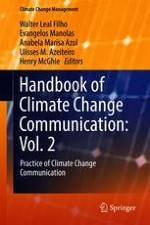
2018 | OriginalPaper | Buchkapitel
Weather Forecasting Using Local Traditional Knowledge (LTK) in the Midst of Climate Change in Domboshawa, Zimbabwe
verfasst von : Vincent Itai Tanyanyiwa
Erschienen in: Handbook of Climate Change Communication: Vol. 2
Aktivieren Sie unsere intelligente Suche, um passende Fachinhalte oder Patente zu finden.
Wählen Sie Textabschnitte aus um mit Künstlicher Intelligenz passenden Patente zu finden. powered by
Markieren Sie Textabschnitte, um KI-gestützt weitere passende Inhalte zu finden. powered by